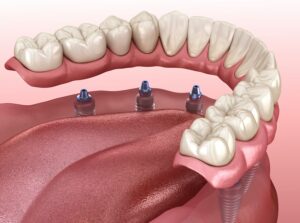You can find long-lasting and comprehensive tooth replacement treatment through implant dentistry. Dental implants use anchors that fuse with the jawbone to provide optimal support for prosthetic teeth.
Though the advantages of these restorative dental solutions are clear, you will need to take care of your smile and your appliances to get the most out of this treatment. Otherwise, you could risk dental implant failure, an emergency in which a dentist will need to urgently remove these appliances from your mouth. Read on to find advice from your dentist to preserve your dental implants and avoid the failure of these fixtures.

Tips to Protect Your New Dental Implants
Follow Aftercare Guidelines from Your Dentist
Your dentist will evaluate your oral health to ensure you are stable enough and a good candidate for implant dentistry. Dental implants rely on titanium anchors fusing with bone in the jaw that support prosthetic teeth.
Without a strong jawbone to support the anchors of the implant, you cannot receive implants successfully. So dentists check jaw health first before proceeding with treatment.
Implant dentistry is a multi-step process, and after each part of the tooth replacement treatment, your dentist will give you aftercare instructions that you should follow. These care guidelines ensure you get the most from these devices and that they will continue to succeed throughout the several-month-long treatment.
For instance, after you the anchor placement surgery, you will need to be gentle with the surgical sites as you heal and the fusion with the jawbone takes place. But you will still need to care for your oral health. A dentist will tell you how to keep your smile clean without harming your dental work.
They will also provide you with pain management advice that will minimize discomfort during recovery. Extreme pain not helped by these tips, swelling, and bleeding are signs of dental implant failure. If this occurs, call your dentist right away as they might need to remove the failing implant from your mouth.
Continue Good Oral Hygiene Habits
As mentioned, you will receive guidelines from your dentist to care for your teeth and implants for optimal recovery. But you will also need to continue good oral health habits on your own to prevent dental implant failure. However, you should use gentle techniques during the early stages of healing.
Fortunately, dental implants will not require more maintenance than your usual routine by the end of your treatment. Some dentists might suggest special flossers or brushes to better clean around your implants, but you should adhere to your regular oral hygiene regimen.
This entails brushing your teeth at least twice daily, flossing each day, and visiting your dentist for routine teeth cleanings. Without proper oral hygiene, you could form cavities or gum disease.
These issues can negatively impact your dental health as well as your implants. If you do develop dental problems or notice symptoms of implant failure, let your dentist know as soon as you can.
